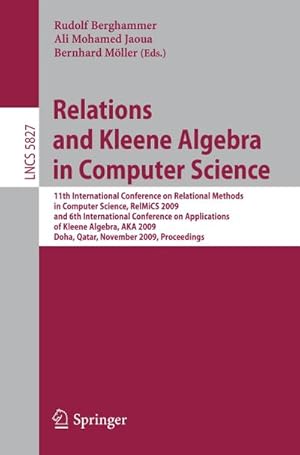This volume contains the proceedings of the 11th International Conference on RelationalMethodsinComputerScience(RelMiCS11)andthe6thInternational Conference on Applications of Kleene Algebra (AKA 6). The joint conference took place in Doha, Quatar, November 1-5, 2009. Its purpose was to bring - gether researchersfrom various subdisciplines of computer science, mathematics and related ?elds who use the calculus of relations and/or Kleene algebra as methodological and conceptual tools in their work. This conference is the joint continuation of two di?erent strands of meetings. The seminars of the RelMiCS series were held in Schloss Dagstuhl (Germany) in January 1994, Parati (Brazil) in July 1995, Hammamet (Tunisia) in January 1997, Warsaw (Poland) in September 1998, Qu´ ebec (Canada) in January 2000, and Oisterwijk (The Netherlands) in October 2001. The conference on Appli- tions of Kleene Algebra started as a workshop, also held in Schloss Dagstuhl, in February2001.Tojointhesetwothemesinoneconferencewasmainlymotivated by the substantial common interests and overlap of the two communities. Over the years this has led to fruitful interactions and openened new and intere- ing research directions. Joint meetings have been held in Malente (Germany) in May 2003, in St Catherines (Canada) in February 2005, in Manchester (UK) in August/September 2006 and in Frauenw¨ orth (Germany) in April 2008. This volume contains 24 contributions by researchersfrom all overthe world.
The book constitutes the joint refereed proceedings of the 11th International Conference on Relational Methods in Computer Science, RelMiCS 2009, and the 6th International Conference on Applications of Kleene Algebras, AKA 2009, held in Doha, Qatar in November 2009.
The 22 revised full papers presented together with 2 invited papers were carefully reviewed and selected from numerous submissions. The papers describe the calculus of relations and similar algebraic formalisms as methodological and conceptual tools with special focus on formal methods for software engineering, logics of programs and links to neighbouring disciplines. Their scope comprises relation relation algebras and Kleene algebras, related formalisms such as process algebras, fixed point calculi, idempotent semirings, quantales, allegories, dynamic algebras, cylindric algebras and their applications in areas such as verification, analysis and development of programs and algorithms relational formal methods such as B or Z, tabular methods, algebraic approaches to logics of programs, modal and dynamic logics, interval and temporal logics, algebraic semantics of programming languages , graph theory and combinatorial optimization, games, automata and language theory, mechanised and automated reasoning, decision procedures, spatio-temporal reasoning, knowledge acquisition, preference and scaling methods or information systems.
![]()
